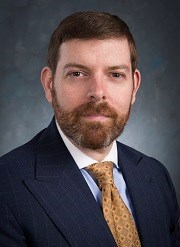THUNDER BAY -- A Lakehead University law professor wants to prevent the governing body for the legal profession from forcing lawyers to adopt a statement of principles acknowledging their obligation to promote equality, diversity and inclusion in their behaviour towards colleagues, employees, clients and the public.
Ryan Alford, in an application filed earlier this month, is asking the Superior Court for a declaration that the requirement "is not supported by the Rules of Professional Conduct" and "is contrary to the rule of law."
He also wants a declaration that it violates the Charter of Rights and Freedoms.
The Law Society established the requirement in September as parts of its Accelerating Culture Shift initiative, which it said was aimed at breaking down barriers faced by racialized lawyers.
Alford teaches constitutional and administrative law at the Lakehead law school.
In an interview with tbnewswatch.com, he said no one denies that systemic barriers faced by racialized lawyers are a severe problem that the law society should address, but "this one provision in particular can't withstand constitutional scrutiny."
Alford said the case requires a clear analysis of how far the law society's powers extend. "At the end of the day, we just want to see that there are some limitations on what it can do...Once that question is resolved, we'd see that this is, in fact, a violation of the charter."
He said a lot of lawyers accept that there is a Charter issue involved, whereas the Law Society "is pretending that one doesn't exist."
Alford said requiring lawyers to make a statement that, "in the Law Society's words, is intended to indicate a personal valuing of the values of equity, diversion and inclusion," amounts to forced speech, the type that he said the Supreme Court has previously ruled is not characteristic of a free society, "and is in fact totalitarian in its implications."
The Canadian Constitutional Foundation, a registered charity that bills itself as a defender of constitutional rights and freedoms, is supporting Alford's suit financially.
Asked whether it's unusual for a lawyer to take his own governing body to court, Alford replied that it's becoming more frequent because, in his view, the Law Society has taken on "a very aggressive interpretation of its own powers."
However, he said, he wants to be "charitable" with respect to this particular case.
"When you have a pressing problem that you want to address...the really significant barriers that young, racialized lawyers face when they're entering the legal profession...we kind of lose sight of the fact that jettisoning the view of our legal restrictions or the constitutional limits on what we can do might have really dangerous effects as precedent."
Alford said the case has profound implications across society because if the Law Society is allowed to act outside its powers, government "acting in many different capacities, other administrative bodies, the legislature itself, can also operate outside of its limits in ways that we couldn't possibly anticipate."
A spokesperson for the Law Society told tbnewswatch.com that it is still reviewing Alford's application and will be responding to it.
